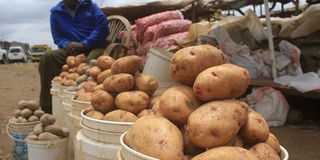Nyandarua in race to end drop in Irish potato

A trader selling Irish potatoes at Chaka market in Nyeri on September 3, 2018. Potato farming is plummeting. PHOTO | FILE | NATION MEDIA GROUP
What you need to know:
- Experts and growers agree that the cost of production, massive land subdivision and population growth are also contributing to potato shortage.
- The county government, supported by the European Union, has started a Sh120 million seed multiplication programme at Ol Joro Orok Agricultural Training College.
Mr Jimmy Mugo Muthoni of Rwanyambo village in Kinangop Constituency, Nyandarua County, was an Irish potato farmer for four years before abandoning the crop for cabbages.
The father of one says he gave up potato farming due to declining production, unpredictable markets and high production costs.
He planted his first crop in 2015 and harvested 80 bags of potatoes from an acre, but production continued to decline. Last year he harvested 40 bags.
He then sold the crop to brokers at Sh1,500 per bag earning Sh60,000. His production costs were Sh70,000.
“I realised that I was operating at a loss and decided to replace potatoes with cabbages,” Mr Mugo said.
DECLINE
At Tumaini market in Mirangine Sub-County, Mr Morgan Macharia, the chairman of Gathundia Youth Self Help Group, said members are experiencing similar challenges.
They are not alone. So low is Kenya’s potato production that much of it now comes from as far as Egypt and southern Tanzania. And it arrives in Nairobi at a cost cheaper than the produce from Ol Kalou, less than 150km from Nairobi.
Agricultural experts admit that potato production has been plummeting.
Experts attribute the worrying trend to low access of certified seeds, politics, climate change, high cost of production, declining agricultural land, and traditional farming practices.
SEED PRODUCTION
Prof Aggrey Nyende, the director of Institute of Biotechnology Research at Jomo Kenyatta University of Agriculture and Technology, said access to certified seeds stands at less than one percent.
The average production is 3.5 tonnes per hectare compared to potential capacity of 30 tonnes, he said.
An acute shortage of investors interested in certified potato seed production has made the situation worse.
His sentiments were shared by Dr Daniel Gikaara, the Nyandarua County Agriculture Chief Officer. “We have had a shortage of certified seeds for a long time. A maize farmer, for instance, can be referred to a nearby dealer to buy certified seeds.
"Even here in Nyandarua, we refer them to the Agricultural Development Corporation in Molo, the Kenya Agricultural and Livestock Research Organisation in Tigoni, and Meru Kisima Farm,” he said.
OBSTACLES
He said the cost of setting up a certified potato seed breeding business is prohibitive. For example, to start a medium-sized seed breeding and multiplication unit one needs Sh120 million.
Climate change is another hindrance to potato farming. Prof Nyende also blamed importation of potatoes from neighbouring countries, saying it is killing the local industry.
The experts and growers agree that the cost of production, massive land subdivision and population growth are also contributing to potato shortage.
In ideal weather and adherence to best farming practices, an acre should produce between 30 and 40 tones. However, Nyandarua, the highest potato producing county in the country, averages 15 tonnes per hectare.
Dr Gikaara said Nyandarua has higher access to certified seeds at five percent, which the county and its partners are working to increase to over 50 percent by end of 2020.
PARTNERSHIP
To help stem the decline, the county government, supported by the European Union, has started a Sh120 million seed multiplication programme at Ol Joro Orok Agricultural Training College.
Construction of cold storage and an agri-hub funded by German firm BASF at a cost of Sh1 billion is set to commence in October.
The county has imported some improved potato seed tuber varieties now under trial. Shortage of labour has also forced the county to promote mechanisation.
Other challenges are potato diseases like bacterial wilt and nematodes. “The biggest challenge with nematodes is that it takes a very long time to manifest, up to 30 years for severe consequences to be felt. That 95 percent of our farmers recycle seeds makes them prone to disease attacks,” Dr Gikaara observed.
WARNING
Earlier this year, the Ministry of Agriculture revealed that the country was facing an acute shortage of Irish potatoes, with a supply gap of about 1.7 million metric tons.
As a result, processors and traders have had to import the commodity, a move which spikes the cost of the crop and its products.
But experts point out that importation by leading restaurants has to do with quality rather than shortage.
Dr Timothy Njagi, a development economist at Tegemeo Institute of Agricultural Development, said that when international fast food joints set up shop, they avoid risks by going for what they know is best for their consumers.
Dr Njagi said that while the country needs to enhance Irish potato production, local farmers also need to have the right varieties that meet market standards.
SEED QUALITY
He said the restaurants should contract farmers to produce the potato varieties they need to curb importation. “This is a good opportunity for county governments to come in and facilitate contracts between smallholder farmers and restaurants,” he said.
Meanwhile, the government is set to release new high quality potato seed varieties.
Kenya Plant Health Inspectorate Service Managing Director Esther Kimani said they had released more than 10 varieties suitable for chips and urged the private sector to multiply them and make them available to farmers.
“The potato qualities have been improved to meet the standards required by the processors,” she said.





